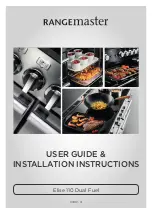6
IMPOR
IMPOR
IMPOR
IMPOR
IMPORT
T
T
T
TANT SAFETY NO
ANT SAFETY NO
ANT SAFETY NO
ANT SAFETY NO
ANT SAFETY NOTICE
TICE
TICE
TICE
TICE
The California Safe Drinking Water and Toxic Enforcement Act requires the Governor of California to
publish a list of substances known to the state to cause cancer, birth defects or other reproductive harm,
and requires businesses to warn customers of potential exposure to such substances.
Safety
IMPORTANT SAFETY INSTRUCTIONS FOR USING YOUR COOKTOP
• Know which touch key pads controls each surface of the Cooking Zones.
• Clean the appliance regularly to keep all parts free of grease that could catch fire.
Exhaust fan ventilation hoods and grease filters should be kept clean. Do not allow grease to
accumulate on hood or filter. Greasy deposits in the fan could catch fire. When flaming food
under the hood, turn fan on. Refer to hood manufacturer's instructions for cleaning.
•
Use Proper Pan Size
. This appliance is equipped with one or more Cooking Zones of different
sizes. Select utensils having flat bottoms large enough to cover the Cooking Zones. The pan
detection sensors will not allow the affected Cooking Zones to operate without a pan present.
• Utensil Handles Should Be Turned Inward and Should Not Extend Over Adjacent
Cooking Zones
. To reduce the risk of burns, ignition of flammable materials, and spillage due
to unintentional contact with the utensil.
• Never Leave Prepared Food on the Cooking Zones.
Boilovers cause smoking and greasy
spillovers that may ignite, or a pan that has boiled dry may melt or become damaged.
• Protective Liners
. Do not use aluminum foil to line any part of the cooktop. Only use
aluminum foil as recommended after cooking process, if used as a cover to be placed over the
food. Any other use of aluminum foil may result in the risk of electric shock, fire or short circuit.
• Glazed Cooking Utensils
. Only certain types of glass, glass/ceramic, ceramic,
earthenware, or other glazed utensils are suitable for range top service without breaking due
to the sudden change in temperature. Check the manufacturer's recommendations for
cooktop use.
• Ventilating hood.
The ventilating hood above your cooking surface should be cleaned
frequently, so the grease from cooking vapors does not accumulate on the hood or filter.
FOR CERAMIC-GLASS COOKTOP ONLY
• Do Not Clean or Operate a Broken Cooktop.
If cooktop should break, cleaning solutions
and spillovers may penetrate the broken cooktop and create a risk of electric shock. Contact
a qualified technician immediately.
• Clean Cooktop with Caution.
If a wet sponge or cloth is used to wipe spills on a hot cooking
area, be careful to avoid a steam burn. Some cleaners can produce harmful fumes if applied
to a hot surface.
• Do Not Place Hot Cookware on Cold Cooktop Glass.
This could cause glass to break.
• Do not slide pan across the cooktop surface.
They may scratch the cooktop surface.
• Do Not Let Pans Boil Dry.
This may cause permanent damage in the form of breakage,
fusion, or marking that can affect the ceramic-glass cooktop. (This type of damage is not
covered by your warranty).


















